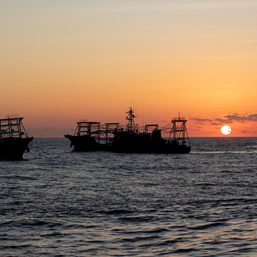SUMMARY
This is AI generated summarization, which may have errors. For context, always refer to the full article.
![[ANALYSIS] Where China’s aggressive action is taking the world](https://www.rappler.com/tachyon/2020/09/tl-naval-arms-race.jpg)
These are the remarks of retired Supreme Court senior associate justice Antonio T. Carpio at the ADR Institute webinar on Wednesday, September 16.
Let me give an overview of the South China Sea (SCS) dispute. The dispute, the most complicated territorial and maritime dispute in the world today, has 3 dimensions.
First, there is a territorial dispute between China and 4 ASEAN coastal states – the Philippines, Vietnam, Malaysia, and Brunei – over geologic features above water at high tide that are entitled to 12 nautical territorial seas. There is no tribunal that has jurisdiction over this territorial dispute, unless the countries to the dispute voluntarily submit the dispute to arbitration. This is unlikely to happen because China has stated it will not submit to arbitration on territorial disputes.
Like other territorial disputes in other parts of the world where the parties refuse to arbitrate, the territorial dispute in the SCS will go on and on for the next several decades. Fortunately, the geologic features involved in the dispute are tiny islands or rocks, barely above water at high tide. There is no urgency to resolve the territorial dispute.
In any event, these tiny geologic features will most likely be submerged by sea level rise by the turn of this century and beyond. In that eventuality, the submerged geologic features will form part of the exclusive economic zone (EEZ) of the adjacent coastal state, and that is the Philippines.
Second, there is the maritime dispute over sovereign rights to the resources of waters enclosed by China’s nine-dashed line which encroaches on the EEZs and extended continental shelves (ECSs) of 5 ASEAN coastal states – the Philippines, Vietnam, Malaysia, Brunei and Indonesia. All the states to this maritime dispute are parties to the United Nations Convention on the Law of the Sea (UNCLOS). This maritime dispute was resolved in the South China Sea Arbitration where the arbitral tribunal ruled that China’s nine-dashed line cannot serve as legal basis to claim any of the waters or resources in the SCS.
While technically the arbitral ruling applies only to the maritime dispute between the Philippines and China, it is expected that, if arbitration cases are filed, the same ruling will be handed down in China’s dispute with Vietnam, Malaysia, Brunei and Indonesia. There is urgency to resolve the maritime dispute because the exploitation of the oil and gas within their EEZs is vital for the economies of the Philippines, Vietnam, Malaysia and Brunei.
Third, there is the innocent passage and freedom of navigation and overflight dispute between China on one side, and the US, UK, France, Australian, Japan and Canada on the other side. China holds the view that in the territorial sea innocent passage requires prior notice of the passage to China, and in the EEZ naval and aerial military exercises require the prior consent of China.
The opposite view
The US and the other naval powers hold the opposite view.
However, when Chinese naval vessels pass on innocent passage through the territorial seas of other coastal states, China does not give prior notice to the adjacent coastal states. When Chinese naval vessels conduct naval drills in the EEZs of other coastal states, China does not secure prior consent from the adjacent coastal states. China practices a double standard.
If China today declares that it will comply faithfully with UNCLOS to which it is a party, and respects the EEZs of the Philippines, Vietnam, Malaysia, Brunei and Indonesia in accordance with UNCLOS, then the SCS dispute will immediately vanish into thin air. All it takes for China and the five Asean coastal states to have peace is for China to comply with its obligations under UNCLOS.
And if China today declares that it will practice in the SCS what it practices in the other seas of the world, in terms of innocent passage and freedom of navigation and overflight, then there will be peace between China on one side and the US and its allies on the other side. But China refuses to respect the EEZs of the five Asean coastal states. China refuses to abandon its double standard on innocent passage and freedom of navigation and overflight. Why?
China’s clear objective in the South China Sea is to control the SCS for economic and military purposes regardless of what UNCLOS and international law prescribe. China wants solely for itself all the economic resources within the nine-dashed line, a maritime space amounting to 85.7 percent of the SCS. China wants all the fish, oil, gas and other mineral resources, including all the islands, atolls and reefs, found within this huge area. China will allow foreign warships and warplanes to sail or fly within this area merely to transit, but not to engage in military drills or activities.
In short, the waters within the nine-dashed line, beyond 12-nautical miles from China’s coastlines, are like territorial waters of China where all economic resources and geologic features belong to China, and where foreign warships and warplanes can only transit on innocent passage. China does not want to call these as territorial waters but that that is the effect of China’s claim.
What is the effect of China’s claim on other coastal states in the SCS? Vietnam will be almost land-locked except for its territorial sea, losing almost its entire EEZ and ECS except for the area near its border with Cambodia facing peninsular Malaysia. Vietnam will lose the entire Paracels and the 21 geologic features it occupies in the Spratlys.
Brunei will be landlocked except for its territorial sea, losing almost all its EEZ and its entire ECS, including Louisa Reef, the sole geologic feature Brunei claims in the Spratlys.
The Philippines will lose almost all its EEZ and its entire ECS facing the SCS. The Philippines will lose the entire Reed Bank, the largest gas field of the Philippines in the WPS.
Malaysia will lose almost all its EEZ and its entire ECS from Borneo facing the SCS. Malaysia will also lose the five geologic features it occupies in the Spratlys. Indonesia will lose part of its EEZ in the North Natuna Islands facing the SCS.
Sweeping effect on PH
The effect of China’s claim on Philippine territory is sweeping. The Philippines will lose the entire Kalayaan Island Group in the Spratlys where the Philippines occupies 9 geologic features. The Philippines will also lose Scarborough Shoal. The Philippines will lose a maritime area larger than its total land area. The nine-dashed line will become China’s national boundary in the SCS.
The Philippines and China will become very close neighbors, with China’s nine-dashed line boundary just 64 kilometers from Balabac Island, the southernmost island of the Philippines facing the SCS, 70 kilometers from the coast of Bolinao town in Pangasinan, and 44 kilometers from Yami Island, the northernmost island of the Philippines in the Batanes. The Philippines and China will be separated by just a narrow strip water that constitutes the territorial sea and the much shrunken EEZ of the Philippines facing the SCS.
If China succeeds in seizing the EEZs of the 5 ASEAN coastal states, thus making the SCS China’s own proprietary lake, then UNCLOS will collapse and will cease to be the constitution for the oceans and seas of our planet. China’s fishing fleet, the largest in the world and enjoying state subsidy, will roam the vast seas which are presently the EEZs of coastal states. China will start extracting oil and gas in waters that are presently the EEZs of Asean coastal states. China’s fishing fleet and drilling platforms will enjoy the protection of China’s powerful navy, now the largest navy in the world in terms of number of ships.
There will be an expensive naval arms race as coastal states acquire warships, warplanes and missiles to protect their maritime zones. There will be instability and skirmishes in the oceans and seas. This is where China’s aggressive action in the SCS is leading the world – to a dangerous and volatile place should China succeed in making the SCS its own lake.
That is why it is vitally important for world peace that the SCS dispute be resolved in accordance with international law, in particular UNCLOS. – Rappler.com
Add a comment
How does this make you feel?









There are no comments yet. Add your comment to start the conversation.